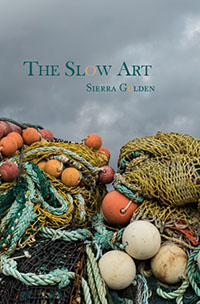Sierra Golden is finding her way in the world

Our September Poet in Residence, Sierra Golden, is at the very beginning of what looks to be a long and important career in poetry. Her debut collection, The Slow Art, was just published this month by Bear Star Press, but she writes with the confidence and the economy of a poet twice her age. This is not something you see in a young poet: Golden inherently understands that what you don't say in a poem is just as important as what you do say, if not more.
"I was always the student who was interested in poetry, from elementary school through high school," Golden tells me over coffee. But she didn't consider herself a poet until college, when she took a workshop with former Washington state poet laureate Tod Marshall. "I still think it's the best workshop I've ever had," she says.
The first piece Golden turned in for the workshop was a poem about fishing. "I spent eight summers working in a commercial fishing boat in southeast Alaska," she explains, "and that became the focal point of most of my writing for a really long time."
Golden is from a fishing family in rural Washington state — her dad has worked as a commercial fisherman for four decades — and when she worked salmon season one summer to pay for school, "I fell in love with it — just being outside, doing something that gives you really immediate feedback. Either you catch or you don't."
The "eternal optimism amongst fishermen" culturally spoke to Golden, but when she was out on the water, she also felt "an elemental connection to the natural world," and that connection gave her a sense that she had a place in that world. Poetry, then, is how she learned to communicate all these elemental emotions. She loves the form for its way of "condensing life into something small and measurable and meaningful and musical."
Her early influences include Sharon Olds, Jack Gilbert, and (on the more contemporary side) Matthew Dickman. Her reading inspired her to pursue an MFA in poetry at North Carolina State University. Golden wasn't sure at that time if she'd be a poet, but "I knew that [the MFA] would be formative and I knew that if I didn't do it then, I might not ever do it."
After moving to Seattle, Golden felt more and more comfortable thinking about herself as a writer. She took a job as a communications associate at an important local nonprofit. "Working at Casa Latina has probably been more affirming than anything else" in terms of helping Golden think of herself as a writer "because I do a lot of the external writing for them. The staff has been very supportive and flexible over the last four years so that I can work on personal projects."
Seattle has embraced her. Golden was selected for Hugo House's Made at Hugo program, which provides educational and resource support for a cohort of young writers. She finds inspiration and draws strength from many Seattle authors including Anastacia Renée, Daemond Arrindell, Elizabeth Austen, and David Wagoner, and she thinks "more people need to know" Bellingham author Nancy Pagh, a creative writing teacher at Western — particularly her book No Sweeter Fat.
Golden is still coming to terms with herself as a Seattle writer. As much as she loves the city, "I still crave a smaller, quieter, less fast" lifestyle like the one she had growing up in rural Washington. She's branching out into other forms, too. "I'm working on a novel," Golden says, "which I never thought I would do and was never interested in."
Still, Golden is getting "the itch" to return to poetry. Writing about fishing, she says, "made me feel like I was cheating or something because it's so visceral and it's really easy to write about it." While the poems in The Slow Art at times feel like journalism, her "next challenge," she says, "is going to be how to write about something less concrete that has the same meaning." Considering all that Golden has accomplished so far, it's obvious that she'll find her way. She always does.